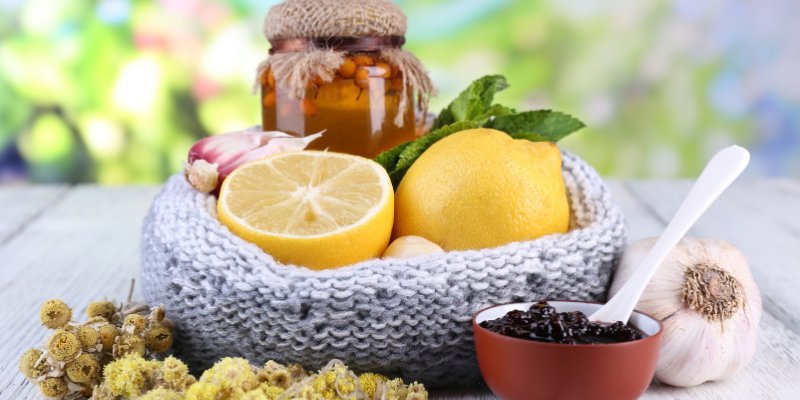Allergies' Bane: 9 Natural Remedies for Soothing Relief
Nov 14, 2023 By Madison Evans
Many of the global population has allergies, which are immune system responses to harmless substances that cause various painful symptoms. Natural allergy therapies have gained popularity due to their possible efficacy and fewer side effects than traditional drugs. This article discusses nine natural home remedies that relieve allergy symptoms and improve health.
Understanding allergies is essential to developing appropriate management options. Pollen, dust mites, cat dander, and some foods trigger the immune system, causing sneezing, itching, and congestion. The effects of allergies range from slight discomfort to severe impairment, emphasizing the importance of identifying triggers and their effects to find effective treatments.

Top 9 Natural Allergy Relief Home Remedies:
Millions worldwide suffer from allergies, disrupting daily life. Natural therapies have gained popularity due to their possible efficacy and fewer side effects than traditional pharmaceuticals. These solutions may help allergen-sensitive people manage their symptoms.
Locally sourced honey:
Local honey, known for lowering seasonal allergy symptoms, may help the body become less sensitive to local pollen. For environmental allergen-sensitive people, gradual exposure may reduce allergy responses.
Quercetin-rich foods:
Include fruits, vegetables, and nuts with a natural pigment with antioxidant and anti-inflammatory properties. This compound's ability to lower histamine production and inflammation makes it a viable natural allergy treatment.
Vitamin C:
Citrus fruits, bell peppers, and strawberries contain natural antihistamines that may reduce allergic symptoms. The antioxidant properties of vitamin C lower histamine levels, helping to manage allergic reactions.
Butterbur:
Natural supplements may be as helpful as antihistamines in treating hay fever symptoms. Butterbur ingredients decrease inflammatory processes, which may help allergy sufferers.
Probiotics:
Probiotics modulate the immune system and may lessen allergic responses, helping allergy sufferers.
Nasal Irrigation:
Irrigating the nose with saline lowers congestion and pollen buildup, relieving allergy symptoms.

Essential Oils:
Essential oils like peppermint and eucalyptus may relieve allergy symptoms due to their anti-inflammatory and decongestant qualities.
Eucalyptus Tea:
This natural decongestant and anti-inflammatory relieves allergies and congestion.
Steam Inhalation:
Steam inhalation clears nasal passages and reduces congestion, relieving allergy symptoms.
These natural therapies, coupled with preventive actions and expert help, can reduce allergy symptoms. These medicines relieve symptoms and help people manage allergies. Before trying new supplements or therapies, especially for severe allergies, visit a doctor for a safe and personalized approach to allergic responses.
How Each Remedy Works:
Honey can relieve allergies due to its pollen exposure. This exposure helps build allergy tolerance. Honey from local sources contains trace amounts of local pollen. Exposure may help the immune system adapt to these allergens, lowering sensitivities. The research is ongoing, but many allergy sufferers report reduced symptoms after eating locally-made honey during high pollen seasons.
Quercetin, found in many fruits, vegetables, and nuts, may help with allergy symptoms. Quercetin reduces inflammation, which is commonly increased during allergic reactions. This chemical also inhibits histamine synthesis, which causes allergic reactions. Quercetin may reduce histamine levels and reduce allergic responses.
Citrus fruits, bell peppers, and strawberries contain vitamin C, an antioxidant that acts as an antihistamine. Vitamin C may reduce allergy responses by lowering histamine. Its antioxidant properties boost immunological health and help the body fight allergies.
Butterbur, a natural supplement, may reduce hay fever symptoms. Butterbur ingredients suppress inflammatory responses, which may help allergy sufferers. Studies suggest these chemicals may behave like antihistamines, offering a natural allergy treatment. Since their efficiency and safety vary, seeing a doctor before using such supplements is essential.
The Role of Lifestyle Adjustments in Allergy Management:
Lifestyle changes are crucial to managing allergies. Simple lifestyle modifications can significantly minimize allergy exposure, complementing natural therapies and improving well-being. Avoidance is crucial to decreasing allergens. Close windows during high pollen seasons, use air purifiers, and clean regularly to reduce dust and pet dander to reduce allergens in living spaces and reduce allergic symptoms.
Healthy eating and hydration help manage allergies. A Vitamin C and antioxidants diet boosts the body's allergy defenses. Maintaining mucus membrane moisture helps eliminate allergies. Regular exercise and stress management boost immunity, reducing allergy symptoms. Yoga and meditation reduce stress and moderate allergic responses, helping allergy sufferers. Smokers must quit to reduce allergic reactions, especially respiratory symptoms. Minimizing secondhand smoke and smoking avoidance significantly reduces allergy exposure.
These lifestyle changes and the top 9 natural allergy relief home treatments create a comprehensive management plan. These steps can significantly limit allergen exposure and help the body fight allergy responses. A personalized and effective allergy control plan requires medical consultation.
Preventative Measures:
Along with natural therapies, reducing allergen exposure is essential for allergy control. Closing windows during heavy pollen seasons can drastically minimize indoor allergies. This simple approach reduces external triggers, relieving environmental allergen sufferers. Home air purifiers can filter airborne allergens, creating a cleaner, allergen-free environment.
Living places must be cleaned regularly to reduce allergens. These frequent cleaning practices dramatically minimize allergens in the home, reducing allergy symptoms.
Lifestyle changes enhance natural allergy treatments. Since smoking worsens respiratory reactivity in allergy sufferers, avoiding it can considerably reduce symptoms. A balanced diet gives the body the resources to fight allergens, potentially lowering allergic reactions. Prevention and natural therapies make allergy management more complete. Simple home improvements and a healthy lifestyle can help people manage and decrease allergic responses.
Consulting a Professional:
While natural therapies may help manage allergies, seeking medical advice is essential, especially for those with severe allergies or considering new supplements or remedies. Healthcare experts tailor advice to an individual's health, current treatments, and medication interactions. This personalized guidance ensures natural therapies work alongside continuous medical care, minimizing risks and optimizing efficacy.
Professional help is needed if allergy problems worsen. Healthcare specialists can determine the best allergy treatment for an individual. Their advice goes beyond recommendations, including the patient's overall health, possible allergy triggers, and the best way to manage and relieve symptoms.
Consulting a doctor can prevent consequences and ensure a safe and successful management strategy for severe or multiple allergic reactions. Due to the complexity and diversity of allergic responses, healthcare experts provide comprehensive allergy management guidance to provide the best and safest treatment for each instance.
Conclusion:
Allergies can be managed holistically using natural therapies. These therapies, preventive measures, and professional assistance significantly reduce allergy symptoms, improving quality of life. These natural remedies relieve symptoms and empower allergy sufferers to manage their allergies. This strategy promotes proactive allergy care, improving health knowledge and management.
These natural therapies and preventive actions help allergy sufferers manage their symptoms. These medicines, lifestyle changes, and medical advice create a more holistic allergy management plan. Healthcare professionals provide personalized advice, helping people manage their allergies better.
Allergy management relies on encouraging medical consultation. This provides personalized counsel, allowing for a more balanced and safe approach to natural therapies while considering individual health concerns, existing medicines, and potential combinations, boosting their efficacy.








